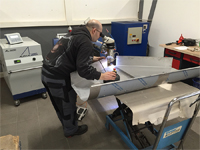13 February 2017
Bright Future for Lasers in Sheet Metal Welding

Welding thin sheet metal using traditional processes can often be challenging. Good penetration is essential to fuse the individual components together, however it can be all too easy to burn right through the material because it heats up very quickly as you weld. Another drawback is that in many cases the components may need to be tacked together to stop them moving during welding.
Lasers however, offer the optimum welding solution for sheet metal welding due to their high welding speed, narrow welding seams and low thermal distortion. These attributes have led to a rise in the uptake of the ALPHA LASER range offered by Bromsgrove based TLM Laser.
With laser welding, the rapid fusing of the material in the laser pulse process combined with very low heat input make this the ideal process for almost distortion-free joining of thin sheet metal. The precise control of the energy input to suit the material, and the ability to shape the pulses also prevent the formation of cracks. Even components produced from differing material types and / or thicknesses can be welded easily. Other distinct advantages include the high density of the finished weld seams and the fact that the laser welding process almost completely eliminates the time consuming and costly finishing processes associated with traditional welding techniques. Laser welded seams also meet all of the requirements for food industry or clean room applications.
The advantages of laser welding, which include high quality seams, dimensional stability, low thermal effect on materials and high levels of repeatability, mean that the process is ideally suited to both the production development and volume manufacturing phases of a project. In addition, the power, precision and flexibility of lasers have initiated many new concepts in component design.
Andy Toms, Director at TLM Laser comments on the growing uptake of lasers for sheet metal applications. “The spectrum of applications where lasers are now being successfully applied is vast. Miniature components with a material thickness of just 0.1 mm can be processed equally as well as complete assemblies measuring 1.0 metre or more. In addition, experience shows that laser welding can deliver a cost reduction of up to 30% when compared to the traditional arc welding process. Add to this a product line that includes both stationary and mobile laser welding systems covering traditional lamp-pumped lasers with power up to 500 W, as well as the latest fibre laser technology that puts out up to 900 W, and it is clear to see why lasers are growing in popularity within sheet metal applications.”
All of the ALPHA LASER systems distributed by TLM Laser in the UK and Ireland are easy to operate and do not require costly setup or programming to get started. Repetitive welding tasks in volume production require no additional CNC knowledge and take just seconds to teach into the system.
One example is the mobile, flexible and programmable ALFlak laser welding system. With its unique arrangement of traversing axes, this mobile system makes it possible to process very large sheet metal parts in situ, or weld small components on a separate work-bench. Weld seams up to 500 mm in length are easily achievable without having to re-position the work-piece.
Circular seams are achieved using a rotating axis. The process is monitored through a stereo microscope and for volume production this can be enhanced with the incorporation of a camera. ALPHA LASER systems have been also developed with ergonomics in mind, to minimise fatigue for the operator.
The growing range of applications where TLM has seen the introduction of lasers for sheet metal production include the manufacture of components for a widely recognised German automotive manufacturer and the repair of safety critical parts for large vehicles, where laser welding was selected following lengthy evaluation of other processes.
Those considering the use of lasers for sheet metal welding can explore the benefits specific to their application by contacting TLM Laser Ltd.
- Contact Information
- Name: Andy Toms
- Email: andy@tlm-laser.com
- Website: www.tlm-laser.com

